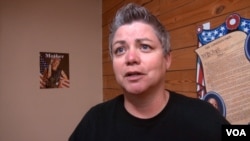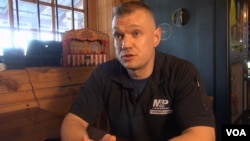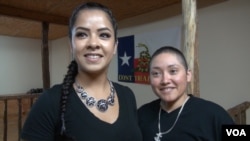Cheryl Burgin is a veteran of the U.S. Marine Corps who knows how to handle firearms and feels the need to have one now as a lesbian living with her wife in Humble, Texas.
“There is a target that has been painted on people’s backs now if they are part of the LGBT community,” Burgin told VOA.
Since the attack on gays and others at the Pulse night club in Orlando, Florida, on June 12 that left 49 people dead, LGBT people around the country have felt something similar could happen to them or the people they love.
In states such as Texas that allow the open carry of firearms for people who obtain a concealed handgun license, many LGBT people now consider wearing a holstered gun or carrying a weapon in a purse or bag as a deterrent to crime as well as senseless attacks.
Gun range lessons
Burgin drove for more than a half-hour to reach the Shiloh Gun and Archery Range in north Houston to take advantage of a special offer to self-identified LGBT people for free lessons needed to obtain a concealed handgun license.
Shiloh general manager Jeff Sanford told VOA the response to the free lessons has been overwhelming.
“What we thought was going to be 40 people, total, has now just totally blown up to 13 classes and we have over 550 signed up, with over a hundred done already," Sanford said.
The gun range had previously offered free classes to firefighters, first-responders and teachers as a promotion. Following the mass shooting in Orlando, a gay customer suggested making the free classes available to LGBT people.
There are many gun ranges around the Houston metropolitan area offering these classes, with prices ranging between $69 and $100. But people who define themselves as part of the LGBT community drive long distances to attend these classes and only partly to save money.
"This is a unique opportunity,” Sanford said. “They can be around like-minded people and they do not have to worry about being judged by anybody in the class.”
Texas gun laws
The Texas license allows someone to carry a pistol in a holster, whether concealed by clothing or not, anywhere in public except places like schools, hospitals, airports and establishments that have posted signs exempting them from allowing guns inside.
Most bars and restaurants, and clubs similar to Pulse in Orlando, do not allow guns, so anyone entering with a gun would be in violation of the law.
Burgin concedes that taking a gun into a bar or night club might not be a good idea anyway.
“You don’t want to mix alcohol and firearms,” she said. “It is not the smartest thing to take it into a club. But if I need to have it nearby, I will make sure I have it with me.”
Desaree Reyes and her wife, Marcella, came together to take the class because of perceived public hostility to their same-sex marriage that makes them fearful, especially after the tragedy in Orlando. But Desaree Reyes admits that she is not sure how she would handle such an incident.
“I don’t feel that just because I have my license that I am going to be ready,” she said. "But I do feel like at least I have that protection.”
Restrictions favored
There are a few national LGBT groups that favor gun ownership for protection against bigoted attacks, such as the Pink Pistols, which formed well before the Orlando shooting but has cited the Florida attack as an example of why gay people need guns.
However, the leaders of most national LGBT organizations have called for stricter gun control measures.
The Human Rights Campaign, the largest group representing the LGBT community in the United States, issued a call for action on gun control following the Orlando shooting.
“The safety of the LGBTQ community depends on our ability to end both the hatred toward our community and the epidemic of gun violence that has spiraled out of control,” group President Chad Griffin said in a statement.
Tim Murphy, spokesman for Gays Against Guns, which has staged anti-gun demonstrations in New York City following the Orlando killings, said, “We are outraged over the massacre that happened in Orlando and we want to signal that the LGBT community is ready to play a role in the fight for gun control."
In arguing against the idea that the solution to gun violence is to have more people with guns, Kendall Thomas, a gay black man and a member of Gays Against Guns, called attention to the gunshot deaths of many young black men in urban centers such as Chicago.
“We have to deal not just with violence against gays or violence against African-Americans and Latino-Americans, but with the culture of violence that leads so many people in this country to view guns as problem-solvers,” Thomas said.
Driven to guns by fear
But gun advocates argue that police can never arrive fast enough to stop violent criminals and terrorists from carrying out a slaughter of innocent people and that having well-trained armed citizens on hand can make a difference.
Whether that is true or not, LGBT people taking up firearms are expressing what even many people who disagree with them see as understandable fear in the wake of a horrific incident in which people like them were targeted.
'Ready to protect myself'
Desaree Reyes, even while conceding that she is a bit of a novice and not fully prepared to use a gun in a chaotic situation, said the pistol she plans to carry would provide comfort.
“If someone were to come towards me or my family, I am already ready to protect myself," she said.
Many of the people who obtain their Texas concealed handgun licenses will practice in gun ranges in order to improve their shooting skills. But those without police or military training may not be prepared to handle a chaotic situation in which it is sometimes difficult for well-trained and well-equipped police officers to know who is the attacker.
Gun control advocates argue that the danger to the people owning the guns and the people with whom they interact in daily life may be greater than any benefit they might provide in a mass-shooting situation.








